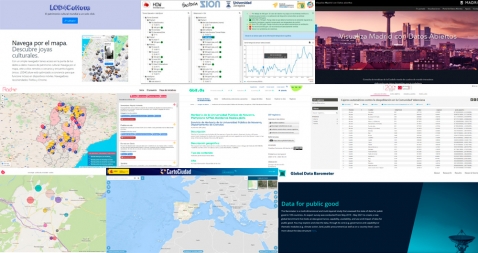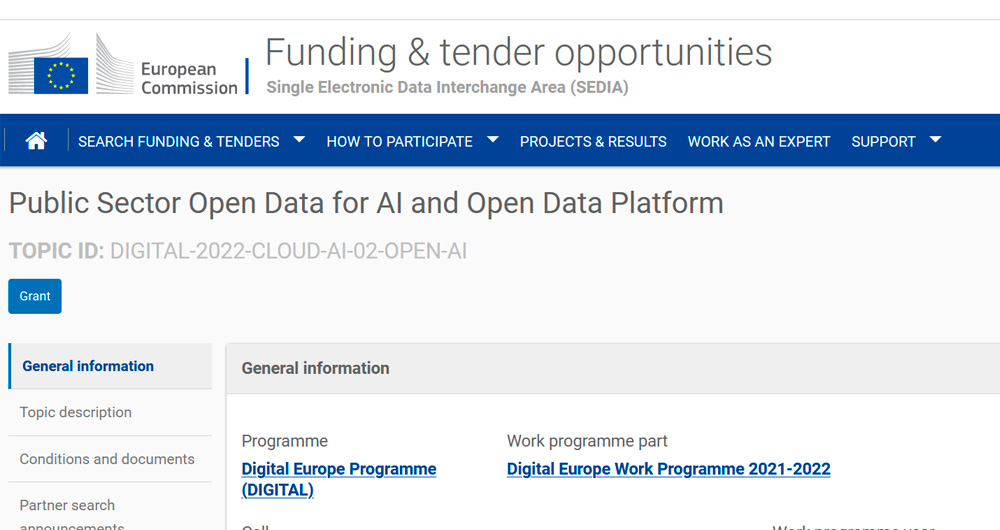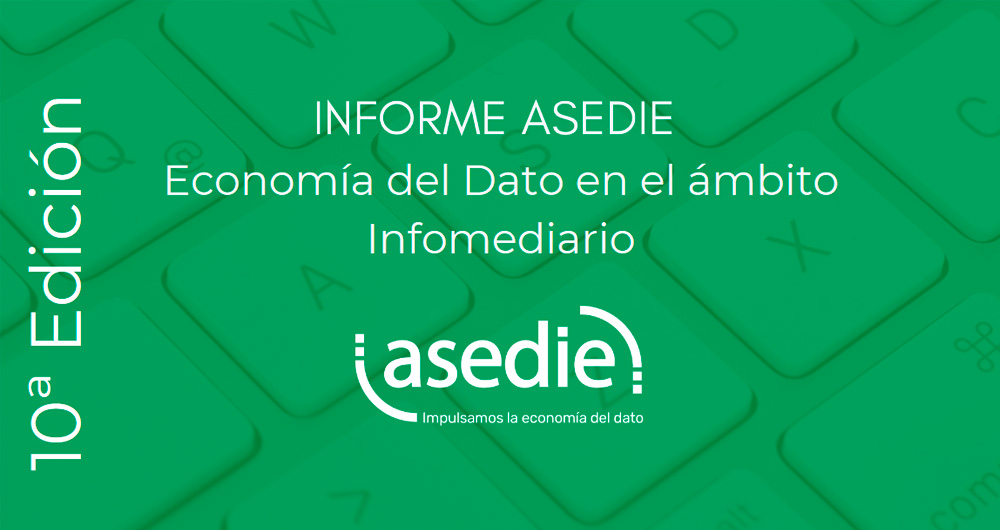What's new in the open data ecosystem (Spring 22)
Fecha de la noticia: 15-06-2022

Spring, in addition to the arrival of good weather, has brought a great deal of news related to the open data ecosystem and data sharing. Over the last three months, European-driven developments have continued, with two initiatives that are currently in the public consultation phase standing out:
- Progress on data spaces. The first regulatory initiative for a data space has been launched. This first proposal focuses on health sector data and seeks to establish a uniform legal framework, facilitate patients' electronic access to their own data and encourage its re-use for other secondary purposes. It is currently under public consultation until 28 July.
- Boosting high-value data. The concept of high-value data, set out in Directive 2019/1024, refers to data whose re-use brings considerable benefits to society, the environment and the economy. Although this directive included a proposal for initial thematic categories to be considered, an initiative is currently underway to create a more concrete list. This list has already been made public and any citizen can add comment until 24 June. In the addition, the European Commission has also launched a series of grants to support public administrations at local, regional and national level to boost the availability, quality and usability of high-value data.
These two initiatives are helping to boost an ecosystem that is growing steadily in Spain, as shown in these examples of news we have collected over the last few months.
Examples of open data re-use
This season we have also learned about different projects that highlight the advantages of using data:
- Thanks to the use of Linked Open Data, a professor from the University of Valladolid has created the web application LOD4Culture. This app allows to explore the world's cultural heritage from the semantic databases of dbpedia and wikidata.
- The University of Zaragoza has launched sensoriZAR to monitor air quality and reduce energy consumption in its spaces. Built on IoT, open data and open science, the solution is focused on data-driven decision-making.
- Villalba Hospital has created a map of cardiovascular risk in the Sierra de Madrid thanks to Big Data. The map collects clinical and demographic data of patients to inform about the likelihood of developing such a disease in the future.
- The Open Government Lab of Aragon has recently presented "RADAR", an application that provides geo-referenced information on initiatives in rural areas.
Agreements to boost open data
The commitment of public bodies to open data is evident in a number of agreements and plans that have been launched in recent months:
- On 13 April, the mayors of Madrid and Malaga signed two collaboration agreements to jointly boost digital transformation and tourism growth in both cities. Thanks to these agreements, it will be possible to adopt policies on security and data protection, open data and Big Data, among others.
- The Government of the Balearic Islands and Asedie will collaborate to implement open data measures, transparency and reuse of public data. This is set out in an agreement that seeks to promote public-private collaboration and the development of commercial solutions, among others.
- The Generalitat Valenciana has signed an agreement with the Universitat Politècnica de València through which it will allocate €70,000 to carry out activities focused on the openness and reuse of data during the 2022 financial year.
- Madrid City Council has also initiated the process for the elaboration of the III Open Government Action Plan for the city, for which it launched a public consultation.
In addition, open data platforms continue to be enriched with new datasets and tools aimed at facilitating access to and use of information. Some examples are:
- Aragón Open Data has presented its virtual assistant to bring the portal's data closer to users in a simple and user-friendly way. The solution has been developed by Itainnova together with the Government of Aragon.
- Cartociudad, which belongs to the Ministry of Transport, Mobility and Urban Agenda, has a new viewer to locate postal addresses. It has been developed from a search engine based on REST services and has been created with API-CNIG.
- Madrid City Council has also launched a new open data viewer. Interactive dashboards with data on energy, weather, parking, libraries, etc. can be consulted.
- The Department of Ecological Transition of the Government of the Canary Islands has launched a new search engine for energy certificates by cadastral reference, with information from the Canary Islands Open Data portal.
- The Segovia City Council has renewed its website to host all the pages of the municipal areas, including the Open Data Portal, under the umbrella of the Smart Digital Segovia project.
- The University of Navarra has published a new dataset through GBIF, showing 10 years of observations on the natural succession of vascular plants in abandoned crops.
- The Castellón Provincial Council has published on its open data portal a dataset listing the 52 municipalities in which the installation of ATMs to combat depopulation has been promoted.
Boom in events, trainings and reports
Spring is one of the most prolific times for events and presentations. Some of the activities that have taken place during these months are:
- Asedie presented the 10th edition of its Report on the state of the infomediary sector, this time focusing on the data economy. The report highlights that this sector has a turnover of more than 2,000 million euros per year and employs almost 23,000 professionals. On the Asedie website you can access the video of the presentation of the report, with the participation of the Data Office.
- During this season, the results of the Gobal Data Barometer were also presented. This report reflects examples of the use and impact of open data, but also highlights the many barriers that prevent access and effective use of open data, limiting innovation and problem solving.
- The Social Security Data Conference was held on 26 May. It was recorded on video and can be viewed at this link. They showed the main strategic lines of the Social Security IT Management (GISS) in this area.
- The recording of the conference "Public Strategies for the Development of Data Spaces", organised by AIR4S (Digital Innovation Hub in AI and Robotics for the Sustainable Development Goals) and the Madrid City Council, is also available. During the event, public policies and initiatives based on the use and exploitation of data were presented.
- Another video available is the presentation of Oscar Corcho, Professor at the Polytechnic University of Madrid (UPM), co-director of the Ontological Engineering Group (OEG) and co-founder of LocaliData, talking about the collaborative project Ciudades Abiertas in the webinar "Improving knowledge transfer across organisations by knowledge graphs". You can watch it at this link from minute 15:55 onwards.
- In terms of training, the FEMP's Network of Local Entities for Transparency and Participation approved its Training Plan for this year. It includes topics related to the evaluation of public policies, open data, transparency, public innovation and cybersecurity, among others.
- Alcobendas City Council has launched a podcast section on its website, with the aim of disseminating among citizens issues such as the use of open data in public administrations.
Other news of interest in Europe
We end our review with some of the latest developments in the European data ecosystem:
- The 24 shortlisted teams for the EUDatathon 2022 have been made public. Among them is the Spanish Astur Data Team.
- The European Consortium for Digital and Interconnected Scientific Infrastructures LifeWatch ERIC, based in Seville, has taken on the responsibility of providing technological support to the global open data network on biodiversity.
- The European Commission has recently launched Kohesio. It is a new public online platform that provides data on European cohesion projects. Through the data, it shows the contribution of the policy to the economic, territorial and social cohesion of EU regions, as well as to the ecological and digital transitions.
- The European Open Data Portal has published a new study on how to make its data more reusable. This is the first in a series of reports focusing on the sustainability of open data portal infrastructures.
This is just a selection of news among all the developments in the open data ecosystem over the last three months. If you would like to make a contribution, you can leave us a message in the comments or write to dinamizacion@datos.gob.es.














